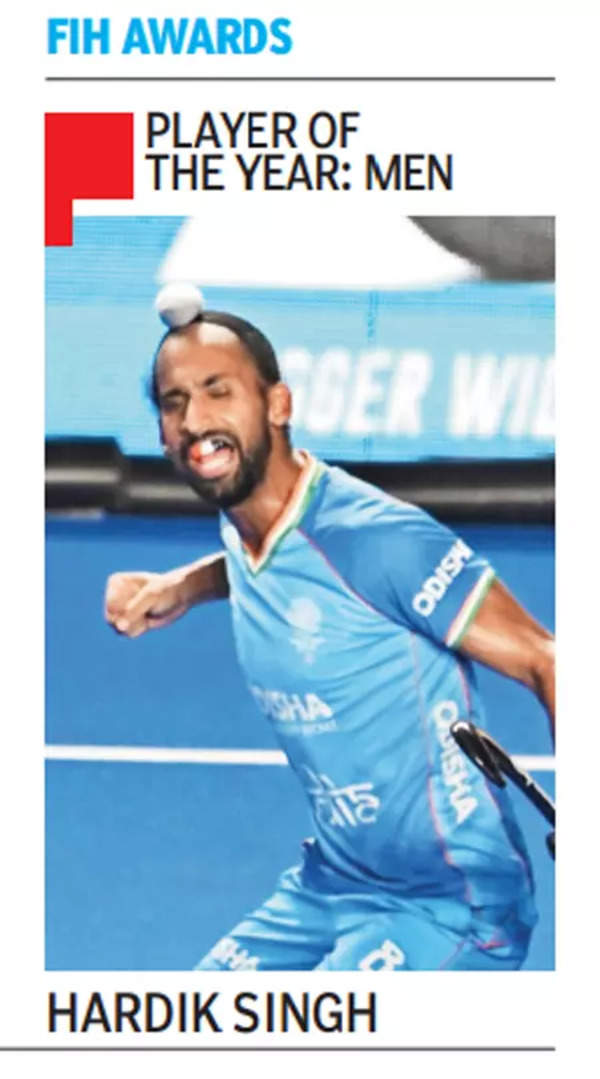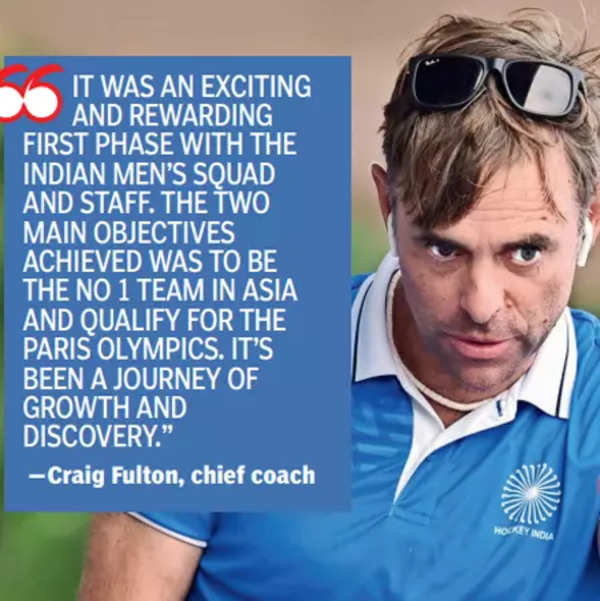On a nippy night at the Birsa Munda
Hockey
Stadium in Rourkela in January, Indian men’s hockey skipper Harmanpreet Singh led his team’s lap of honour, acknowledging the unflinching support of the spectators. The joy and the cheers were misleading enough to create an impression that India had ended their 48-year-old wait for a gold at the World Cup. In reality, the hosts had just carved out a hardfought 5-2 win over South Africa to finish joint ninth with Argentina.
The disappointment notwithstanding, the followers of the sport were willing to back the team, but were the players backing themselves?
It was an abysmal fall for a team, which had raised the hope of the rebirth of
Indian hockey
with a bronze-medal finish at the Tokyo Olympics the previous year. Given the fourth-place finish in the FIH Pro League earlier, it felt like it was back to square one for India. The talk of a rise again seemed like all bluff and bluster.
To make matters worse, the administration was back to doing what it always does. Pin the blame for failure on the coach. In the aftermath, a day after the quadrennial showpiece event, chief coach Graham Reid went home with his team of support staff.
In a statement, Australian Reid said, “It is time for me to step aside and hand over the reins to the next management.”
The question then was, who will the next management comprise? With eight months to go for the
Asian Games
, where a Paris Olympics berth was at stake, who would be willing to risk coming to a country where the only measure of performance is success?

Top coaches from across the world were approached but with little success as most of them were already committed to the Olympic cycle. That is when Hockey India president and former India skipper Dilip Tirkey convinced South African
Craig Fulton
to take over in testing times.
The Belgium assistant coach at Tokyo had previously marshalled the Irish team to a meteoric rise.
While Fulton’s credentials were not up for scrutiny, his race against time to deliver was a topic of debate. But India had picked the best man available for the task. Before dealing with tactics and techniques, it was crucial that Fulton understood the players.

“The biggest challenge was to understand the players and what makes them tick before I put the spin on what I wanted to achieve,” Fulton said.
To understand the players, their culture and background, Fulton bought an India map and had an interactive session where the players spoke about others who hailed from their region and their lives back home. Once that was out of the way, he got down to brass tacks on the field.
From early 2019, the team was accustomed to Reid’s Australia methodology. Fulton couldn’t change that overnight but he infused changes with the primary one being replacing the counterattack with half-court press. Also, players’ roles were redefined.
Former skipper Manpreet Singh, who was starting to look jaded in the midfield, rediscovered himself as an attacking midfielder.
Hardik Singh
, who was injured during the World Cup, came back as a more complete player under Fulton, who instilled a sense of fearlessness amongst the younger players.
Off the field, Fulton roped in fellow South African and mental coach Paddy Upton to help the players to bury the ghosts of failure. Over the past eight months that Fulton has been at the helm, he hasn’t shied away from blooding talent with Paris in mind. Youngsters like Karthi Selvam, Yashdeep Siwach and Rabichandra Singh Moirangthem have been handed India caps.
THE TURNAROUND
The Asian Champions Trophy victory in Chennai in August was a validation of the efforts the core group put in. The changes Fulton had brought about began to show. The familiar woes of conceding last-minute goals were checked, especially in the final against Malaysia, where India, down 1-3 at half-time, came
back to claim a 4-3 triumph.
ASIAN GAMES GLORY
Going into the Hangzhou Asian Games, the team knew nothing but a gold medal mattered. A dominant Indian team was on show in China, as the players finished their Pool A engagements with a clean slate, winning five matches. They scored 58 goals, conceding five. Their biggest challenge came in the semifinals against South Korea, but the team exhibited refreshing calmness to win 5-3 and then defeated Japan 5-1 in the title clash.
Summing up the year of highs and lows, Fulton said, “It was an exciting and rewarding first phase with the Indian men squad and staff. The two main objectives achieved was to be the No. 1 team in Asia and qualify for the Paris Olympics. It’s been a journey of growth and discovery.”
THE FAILED FINISH
But the season ended the way it began for Harmanpreet and his men, with the team losing to Spain, Germany and Belgium before notching up their only win against France in the 5-Nation tournament in Valencia earlier this month.
But with target Paris being the bigger goal, Fulton is not reading too much into the recent results. “We look forward to working harder and smarter together in 2024,” he signed off.












 English (US) ·
English (US) ·